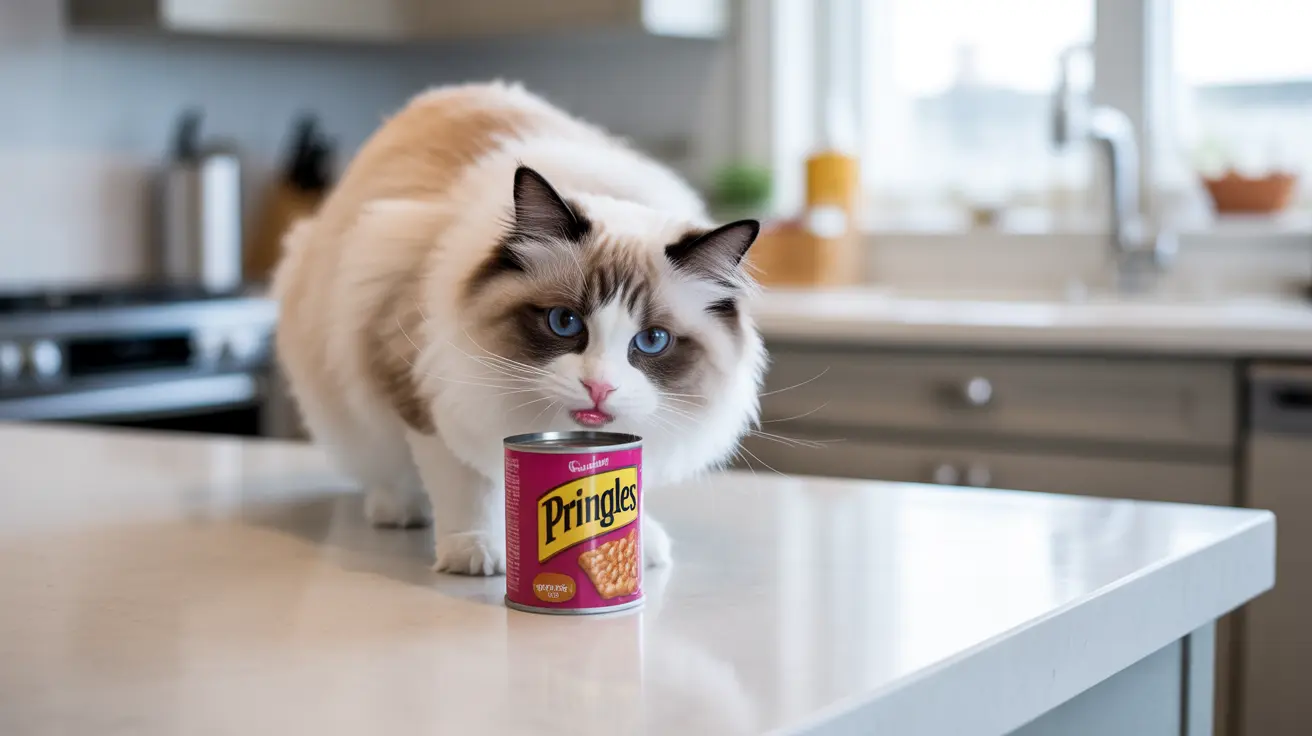If you've ever caught your cat eyeing your Pringles, you might wonder whether sharing a chip is safe. The short answer is no - cats should not eat Pringles. While a tiny crumb of plain Pringles might not cause immediate harm, these popular potato chips contain several ingredients that can be dangerous or even toxic to our feline friends.
In this comprehensive guide, we'll explore why Pringles aren't suitable for cats, what risks they pose, and what to do if your cat manages to sneak some chips when you're not looking.
Understanding the Dangers of Pringles for Cats
Pringles contain several ingredients that make them particularly problematic for cats. The primary concerns include high sodium content, artificial flavors, preservatives, and potentially toxic seasonings. Even plain varieties pose risks due to their fat content and physical structure.
Harmful Ingredients in Pringles
The most concerning ingredients in Pringles for cats include:
- High sodium levels that can lead to dehydration and salt toxicity
- Onion and garlic powder (in flavored varieties) that can cause anemia
- Artificial flavors and preservatives that may upset feline digestion
- Excessive fats that can contribute to obesity and pancreatitis
Health Risks of Feeding Pringles to Cats
Immediate Health Concerns
When cats consume Pringles, they may experience several immediate symptoms:
- Excessive thirst and urination
- Vomiting and diarrhea
- Lethargy and weakness
- Digestive discomfort
Long-term Health Impacts
Regular consumption of Pringles can lead to serious health issues:
- Obesity and diabetes
- Kidney problems from excess sodium
- Chronic digestive issues
- Potential anemia from seasoning exposure
What to Do If Your Cat Eats Pringles
If your cat has consumed Pringles, take these steps:
- Determine how many chips and what flavor they ate
- Monitor for concerning symptoms
- Ensure fresh water is readily available
- Contact your veterinarian if you notice:
- Excessive thirst or urination
- Vomiting or diarrhea
- Unusual lethargy
- Pale gums
Healthy Alternatives to Pringles for Cats
Instead of sharing Pringles, consider these cat-safe treats:
- Commercial cat treats designed for feline nutrition
- Small pieces of plain, cooked chicken or turkey
- Tiny bits of cooked fish (without seasonings)
- Veterinarian-approved cat snacks
Frequently Asked Questions
Can cats safely eat plain Pringles or other potato chips without seasoning?
No, even plain Pringles are not safe for cats. They contain excessive sodium and fats that can harm your cat's health. The crunchy texture can also pose a choking hazard.
What are the health risks of Pringles' salt and seasoning ingredients for cats?
The high salt content can lead to dehydration, kidney stress, and potential salt poisoning. Seasonings, particularly onion and garlic powder, can cause toxic reactions and anemia in cats.
How can onion and garlic powder in flavored Pringles harm my cat?
These ingredients can damage your cat's red blood cells, leading to hemolytic anemia. Symptoms include weakness, pale gums, and difficulty breathing. Even small amounts can be dangerous.
What should I do if my cat accidentally eats flavored Pringles or a large amount?
Monitor your cat closely for signs of distress, provide fresh water, and contact your veterinarian if you notice concerning symptoms like excessive thirst, vomiting, or lethargy.
Are there safer human snack alternatives I can give my cat instead of Pringles?
Yes, you can offer small amounts of plain cooked meat (chicken, turkey, or fish) without seasonings. However, it's best to stick with commercial cat treats specifically formulated for feline nutrition.
Conclusion
While it might be tempting to share your snacks with your feline friend, Pringles should never be on the menu for cats. The risks far outweigh any momentary pleasure, and there are plenty of safer, healthier alternatives available. Keep your Pringles to yourself and show your cat love with appropriate treats instead.






